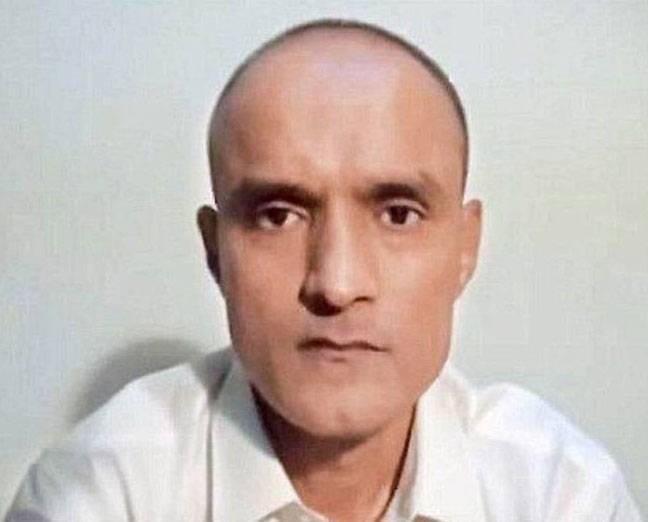ISLAMABAD - Pakistan cannot allow consular access to a convicted terrorist, writes Islamabad in its reply to the International Court of Justice (ICJ) regarding Indian spy Kulbushan Jadhav case.
In the reply, to be sent to the ICJ this week, Pakistan invited the United Nations court’s attention towards Jadhav’s role in the terrorism acts across Pakistan that resulted in scores of deaths in the past.
Already Pakistan has asked India not to equate Kulbhushan Jadhav with civilian prisoners and fishermen.
In July too, Pakistan had rejected New Delhi’s plea to allow consular access to the spy.
The foreign ministry had then said counting Indian spy Kulbhushan Jadhav in the list of civil prisoners and fishermen was a “travesty of logic”.
New Delhi had twice sought consular access to Kulbhushan Jadhav – sentenced to death by a Pakistani military court for fomenting terrorism in Pakistan. On both occasions, Pakistan rejected the requests. India later challenged Jadhav’s conviction in the ICJ.
Pakistan has also challenged the jurisdiction of the ICJ regarding conviction of Kulbhushan Jadhav after the court observed that turning down the request for consular access was a denial of right.
Presenting Pakistani stance, the Director-General of South Asia in Foreign Office Dr Muhammad Faisal had told the ICJ in May that under the Vienna Convention hearing of criminal cases did not fall under the purview of the international court.
He said that “Indian Naval Commander” Jadhav was arrested by Pakistani forces during an operation in Balochistan province and he had confessed to the killing of dozens of innocent Pakistanis.
Dr Faisal said the spies did not have any right of consular access and India did not produce evidence provided by Pakistan against Jadhav in the court. In May, the United Nations top court ordered Pakistan to stay the execution of Jadhav.
Officials at the foreign ministry said that Pakistan’s reply to the ICJ would be sent by October 12. Pakistan is also set to send former chief justice Tassaduq Jillani for the high-profile case in the ICJ.
“The reply has been prepared keeping in view the Geneva conventions. We cannot grant facilities to the criminals and terrorists,” said an official at the ministry.
The reply says, Jadhav entered Pakistan on purpose for spying in the country.
“India has provided fake documents to save Jadhav but we cannot grant consular access to him on the basis of fake documents.”
Foreign Office spokesperson Nafees Zakaria said that confession of serving naval officer of India – Kulbushan Jadhav – was solid evidence of Indian involvement in terrorist activities in Pakistan.
He said that Jadhav was arrested from Balochistan in March 2016 and after due process, he was convicted in April 2017 by a military court and was sentenced to death.
Zakaria said: “Commander Jhadav is a serving Indian naval officer and sent to Pakistan by its intelligence agency RAW [Research and Analysis Wing] for espionage, terrorism and subversive activities, which resulted in loss of many innocent lives and damage to property.”
He added: “Pakistan has implemented the bilateral consular agreement in letter and spirit and is committed to ensuring that humanitarian cases are not held hostage to politics. We expect India to reciprocate through action rather than rhetoric.”
The spokesperson said Pakistan was committed to the implementation of the 2008 agreement on consular access between Pakistan and India, which stipulated the exchange of comprehensive lists of nationals of each country in the other country's jails twice a year on January 1st and July 1st.
Jadhav has filed a mercy petition to army chief Qamar Javed Bajwa, to spare his life on “compassionate grounds”.
Jadhav can still file another appeal to the president if the army chief rejects his plea. Pak-India tension has been running high since July 2016 after the killing of freedom fighter Burhan Wani.
The Indian forces later killed dozens of protesters who condemned the murder.
In September 2016, the tensions rose further as New Delhi blamed Pakistan for the Uri attack, which inflicted the heaviest toll on the Indian army in a single incident in 14 years. Nineteen soldiers were killed in the strike.
Pakistan denied any link.
Conviction of Indian spy Kulbhushan Jadhav has added to the tension.
Former ambassador Fauzia Nasreen said India was sponsoring terrorism in Pakistan but raising hue and cry around the world, posing as a victim.
She said RAW had links with Tehreek-e-Taliban Pakistan (TTP).
“India has taken Jadhav’s case in [the] ICJ just to hoodwink the world. He (Jadhav) is a convicted terrorist. How can we grant him consular access?” Nasreen asked.
Meanwhile, on Sunday, Pakistan People’s Party leader Senator Rehman Malik said India should know Pakistan would not bow on any front.
“India is attempting to defame Pakistan. We will counter this propaganda and India will fail. India is sending terrorists to Pakistan, we will catch them and convict them,” he said.
Speaking to journalists here, Senator Malik said that the United States was also influenced by India’s propaganda and was issuing anti-Pakistan statements. “India will fail in their designs. Their Kulbushan Jadhav has been arrested and convicted. We will also arrest their other agents and treat them under the law. India should stop this negative policy of sending terrorists,” the lawmaker warned.






